|
|
 |
|
|

Law School Applications: Up, Up, and Away | Burns Library Joins Research Library Group | GW Law Professors Receive Prestigious Grants | Minnesota Alumni Reception | Cibinic, Nash Receive DistinguishedAlumni Awards | Talk of Fame | Better Late than Never | GW Law Greets New Faculty Members and Deans | Public Interest Corner | Faculty File | GW in History
Law School Applications: Up, Up, and Away
Two years ago 7,569 candidates applied to GW Law School. Last year the figure rose to 8,447.
This year the increase is even more impressive. Close to 11,000 prospective lawyers have applied to GW Law School, according to Robert V. Stanek, associate dean for admissions and financial aid. Or, to put it in very sharp focus, Stanek asks that we look at it another way: The number of law school applicants nationwide is about 80,795. Of that number, some 10,800 have applied to GW. “That means,” says Stanek, “that one of every eight candidates for law school nationwide has applied to GW Law School. Think about it,” he says. “That’s an amazing statistic.” It becomes even more astonishing when one considers that these applicants are competing for a total of 450 seats—the number of students GW can admit into its JD program.
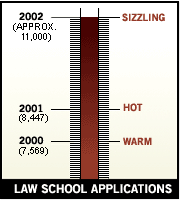 The figures are up across the country, showing about a 20 percent increase. Good as that is, it isn’t even close to GW’s 30 percent increase. Obviously, GW is seen as a ‘hot’ law school. The figures are up across the country, showing about a 20 percent increase. Good as that is, it isn’t even close to GW’s 30 percent increase. Obviously, GW is seen as a ‘hot’ law school.
The application deadline was March 1. To date, the Law School has sent out some 8,000 letters—letters that either offer admission, tell applicants they are on the waiting list, or letters that reject applicants outright. Those on the waiting list are strong candidates who may well end up at GW if some of those offered admission opt to go elsewhere.
As to why so many people are applying to law schools this year, there are several theories but no absolute answers, according to Stanek. “One notion is that this is generated by the economy,” he says. “It may be harder now for young professionals to get the job they want, or to move to one they want more.” Law school, in other words, may provide the promise of a ‘safe haven’ during unstable economic times.
The Law School still has not completely achieved male/female parity. This year’s class was 52 per cent male, 48 per cent female. Often the number of females offered admission has exceeded the number of males, but when the dust settles, there have always been more men than women in the JD program. Bob Stanek is hoping that this year—or next—we’ll reach 50/50.
—Sandy Holland
Burns Library Joins Research Library Group
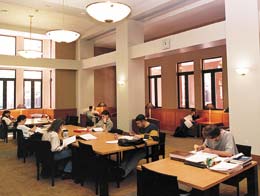 The Jacob Burns Law Library at GW Law School last fall became a member of the Research Library Group, an international alliance of more than 160 libraries and research institutions. The Jacob Burns Law Library at GW Law School last fall became a member of the Research Library Group, an international alliance of more than 160 libraries and research institutions.
“This marks a major milestone in the development of the Law Library,” according to Scott Pagel, director of the Law Library and associate dean for information services. The affiliation is “a direct result of the efforts made by the Law School to devote significant financial resources to the research needs of its faculty and students.” Indeed, the latest information available from the ABA showed that GW ranked 11th out of 182 law schools during the 1999-2000 fiscal year for expenditures on books and other library materials.
The Law School community now has access to the libraries of such leading universities as Harvard, Columbia, Yale, and Berkeley. In addition, national libraries such as The Bibliotheque Nationale de France, The British Library, and The Library of Congress are accessible—as are collections in institutions such as The Newberry Library, The Smithsonian Institution, and The Holocaust Memorial Museum.
“While the Law Library has always had an excellent collection, we can now acquire many specialized and unique materials in areas such as international law, intellectual property, government procurement, environmental law, and legal history,” Pagel says. He also notes that in the short time since the Law School became a member of the group, the value of membership has become a two-way street, with many member institutions using the Law School’s resources as well.
The Research Library Group is a nonprofit organization founded in 1974. It is devoted to improving access to information that supports research and learning. As Pagel puts it, “We’ve joined our peer institutions in their efforts to serve researchers on a more sophisticated level and with an even wider array of resources.”
—SH
GW Law Professors Receive Prestigious Grants
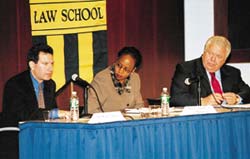
At the GW International Forum on Sustainable Cities, best-selling author Robert Kaplan, South African Housing Minister Sankie Mthembi-Mahanyele, and Brazilian Gov. Jaime Lerner. The forum was moderated by Professor Jonathan D. Weiss of the Center on Sustainable Growth.
|
Several GW Law professors were awarded prestigious research grants in recent months, further strengthening the University’s prominent leadership role in the national legal arena.
Ira Lupu, the Louis Harkey Mayo Research Professor of Law, and Robert Tuttle, associate professor of law, received a two-year grant from the Pew Charitable Trusts to study the legal aspects of government partnerships with faith-based organizations in the provision of social services. Part of a larger project known as the Roundtable on Religion and Social Welfare Policy, Lupu’s and Tuttle’s work involves tracking and analyzing at the federal, state, and local levels the legal and constitutional developments in the area of government aid to faith-based social welfare organizations.
Widely recognized for their scholarship in this area, Lupu is one of the leading constitutional scholars in the United States on church-state issues, and Tuttle is a prominent religious ethicist. Their jointly authored work, “The Distinctive Place of Religious Entities in Our Constitutional Order,” was recently published in Villanova Law Review, v. 37.
“We both feel extremely grateful for the support of the people at the Pew Charitable Trust,” says Lupu. “The grant affords us the opportunity to do a legal research project in an area that we feel is very important in the development of constitutional law and to the idea of progress in public/private partnerships in the delivery of much-needed social services.”
Professor Jonathan Weiss, executive director of the GW Center on Sustainable Growth and a leading expert on cities, received a grant from the Ford Foundation to work with the environmental justice community to advance legal strategies. The first law school-based program of its kind in the country, the center has quickly established GW as an international leader in the emerging area of smart growth and sustainability.
As part of the grant, the center hosted a national forum on the Supreme Court’s decision in Alexander v. Sandoval, including a discussion about the implications of the case for environmental justice and community health. Weiss also organized a strategy session in November that brought together key civil rights and environmental leaders to discuss environmental justice legal strategy.
The center’s environmental justice work is just a small part of its broader portfolio of looking at how to make cities and regions more livable places. As part of that larger picture, the group hosted an international forum on sustainable cities on Feb. 13. The forum, which was broadcast on Voice of America, featured a debate about the future of cities around the world, particularly in the wake of the Sept. 11 terrorist attacks.
Featured speakers included Gov. Jaime Lerner of Curitiba, Brazil—a city the size of Houston that has been hailed as a model of sustainable urban development; South Africa’s Minister of Housing Sankie Dolly Mthembi-Mahanyele, and American foreign correspondent Robert D. Kaplan, the best-selling author of nine books on international affairs. The discussion was moderated by Weiss, who served in the White House during the Clinton administration as an adviser to Vice President Gore on sustainable growth and urban issues.
One exciting outcome of the pathbreaking forum was an announcement by Lerner and Weiss of a new partnership between the GW Center and the Free University on the Environment in Curitiba. “We will collaborate on promoting international exchange on urban sustainability,” says Weiss. “This new relationship further broadens our international work and exposure.”
—Jamie L. Freedman
|
|
Minnesota Alumni Reception
Northwest Airlines President Douglas M. Steenland, JD ’76, Dean Michael K. Young, and Russell A. Anderson, LLM ’77, of the Minnesota Supreme Court gathered last fall for a reception co-hosted by Steenland, Anderson, and Rep. Jim Ramstad (R.-Minn.), JD ’73. Young and several Minnesota alumni gathered at the IDS Building in Minneapolis. Although Ramstad was unable to attend, Steenland and Anderson both spoke about their law school experiences and the importance of their law degrees. Young shared his report on the state of the Law School.
|
Cibinic, Nash Receive DistinguishedAlumni Awards
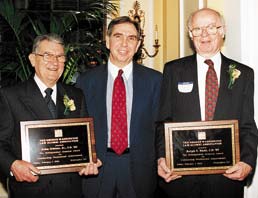
Professor Emeritus John Cibinic Jr., Dean Michael K. Young, and Professor Emeritus Ralph C. Nash Jr. display the Distinguished Alumnus Awards.
|
More than 400 alumni, faculty members, and friends gathered at the Willard Hotel on Feb. 1, 2002, to honor Professors Emeritus John Cibinic Jr., JD ’60, and Ralph C. Nash Jr., JD ’57, with Distinguished Alumni Awards. In addition to being alumni, Cibinic and Nash served the Law School as full-time faculty members for a combined total of more than 60 years. Through their creation of a core library of respected and heavily used books, they have shaped the academic discipline of government contract law.
During their decades of teaching at GW Law, they enlightened numerous students, many of whom were fortunate enough to serve as Government Contracts Program research assistants. Cibinic and Nash also initiated a groundbreaking post-JD program, supervising and guiding a generation of lawyers towards their master of laws or doctor of juridical science degrees. Their labors have resulted in a wealth of published scholarship by GW Law alumni that enriches the literature and continues to influence the adjudicators and the government contracts bar. As a result of their shared legacy, GW Law School sits firmly at the pinnacle of government contract law teaching.
The large, enthusiastic, (and, at times, loud) crowd at the gala alumni dinner was an exceptional tribute to two distinguished law school alumni who influenced a generation of GW Law School graduates, shaped the field of government contract law, and continue to reflect the excellence of GW Law School.
Talk of Fame
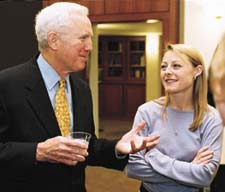
Court TV’s Fred Graham talks with 3L Erin Hirsh.
|
Each year, GW Law’s Enrichment Program continues to draw the best and brightest notable legal minds. This year’s Enrichment series was organized by Jeffrey S. Guttman, assistant dean for academic affairs and professor of clinical law. Listed here are some of the 2001-02 academic year Enrichment Program visitors who enlightened GW Law students, faculty members, and friends with their behind-the-scenes expert commentary:
- Former Israeli Supreme Court Justice Gabriel Bach
- Fred Graham, chief anchor and managing editor of Court TV
- Common Cause CEO Scott Harshbarger
- ABA President Robert A. Hirshon (22nd Annual Manuel F. Cohen Lecture)
- Florida Supreme Court Justice Barbara Pariente, JD ’73
- NPR Chief Legal Affairs Correspondent Nina Totenberg
- Immigration and Naturalization Service Commissioner James W. Ziglar, BA ’68, JD ’72
Better Late than Never
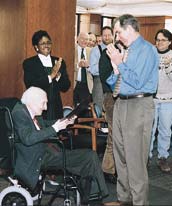 With Dean Young (right foreground) leading the applause, Carl K. Goodson (seated) finally got to hold his GW law diploma in his hands—at age 90! Goodson, a University of Alabama graduate, completed law school at GW in the summer of 1938, whereupon he immediately took and passed the bar and went south looking for work. He missed his law school graduation, and hence missed out on the diploma presentation. With Dean Young (right foreground) leading the applause, Carl K. Goodson (seated) finally got to hold his GW law diploma in his hands—at age 90! Goodson, a University of Alabama graduate, completed law school at GW in the summer of 1938, whereupon he immediately took and passed the bar and went south looking for work. He missed his law school graduation, and hence missed out on the diploma presentation.
Nonetheless, Goodson’s GW Law training stood him in good stead; he engaged in the practice of law from 1939 until May 2000, with time out for service in World War II.
After the war he specialized in trust, estate, and tax areas. He spent some time practicing on his own, but in 1956 he joined with Eugene Carusi and a small New York City firm to become its Washington office, known as Satterlee Browne Carusi & Goodson. Altogether, he and Carusi spent some 30 years in that practice.
—SH
GW Law Greets New Faculty Members and Deans
The Law School extended a warm welcome to several new deans and faculty members in the 2001-02 academic year.
 Matthew P. Harrington is GW Law’s new assistant dean for administrative affairs. Harrington brings extensive academic experience to the law school. Previously, he was professor of law and associate dean for academic affairs at Roger Williams University, where he also taught American legal history, commercial law, and corporations. Harrington’s research interests are in the area of legal and economic history, with a particular emphasis on the commercial law of the early Republic. His writings have appeared in Iowa Law Review, Wisconsin Law Review, Rutgers Law Journal, and the Yale Law & Policy Review. His book on the economic origins of the federal judiciary will be published by New York University Press in 2002. Matthew P. Harrington is GW Law’s new assistant dean for administrative affairs. Harrington brings extensive academic experience to the law school. Previously, he was professor of law and associate dean for academic affairs at Roger Williams University, where he also taught American legal history, commercial law, and corporations. Harrington’s research interests are in the area of legal and economic history, with a particular emphasis on the commercial law of the early Republic. His writings have appeared in Iowa Law Review, Wisconsin Law Review, Rutgers Law Journal, and the Yale Law & Policy Review. His book on the economic origins of the federal judiciary will be published by New York University Press in 2002.
 David M. Johnson is the new assistant dean for student affairs. Previously, Johnson was the director of career services and an adjunct professor teaching the Uniform Commercial Code and Debtor-Creditor Rights at the David A. Clarke School of Law at the University of the District of Columbia. Before that, he was an assistant professor of justice/American government and politics in American University’s Washington Semester Program, where he continues to teach on an adjunct basis. He was a commercial litigator for nearly five years with the law firm of Kegler, Brown, Hill & Ritter in Columbus, Ohio, before entering academia. At the Law School, Dean Johnson teaches in the first-year legal research and writing program. David M. Johnson is the new assistant dean for student affairs. Previously, Johnson was the director of career services and an adjunct professor teaching the Uniform Commercial Code and Debtor-Creditor Rights at the David A. Clarke School of Law at the University of the District of Columbia. Before that, he was an assistant professor of justice/American government and politics in American University’s Washington Semester Program, where he continues to teach on an adjunct basis. He was a commercial litigator for nearly five years with the law firm of Kegler, Brown, Hill & Ritter in Columbus, Ohio, before entering academia. At the Law School, Dean Johnson teaches in the first-year legal research and writing program.
 Richard J. Pierce Jr. was appointed to the law school’s newly created position of associate dean for faculty development. Pierce serves as a point of contact for the law faculty regarding activities designed to facilitate and enhance scholarship and improve teaching. He also provides advice and assistance to faculty members regarding academic and research opportunities for sabbatical and other leaves, including sources of funding. Pierce holds the Lyle T. Alverson professorship at the Law School, has taught at Columbia University, the University of Virginia, Southern Methodist University, Tulane University, the University of Kansas, and was dean of the University of Pittsburgh School of Law. He also has practiced with Sutherland, Asbill & Brennan in Washington, D.C. Richard J. Pierce Jr. was appointed to the law school’s newly created position of associate dean for faculty development. Pierce serves as a point of contact for the law faculty regarding activities designed to facilitate and enhance scholarship and improve teaching. He also provides advice and assistance to faculty members regarding academic and research opportunities for sabbatical and other leaves, including sources of funding. Pierce holds the Lyle T. Alverson professorship at the Law School, has taught at Columbia University, the University of Virginia, Southern Methodist University, Tulane University, the University of Kansas, and was dean of the University of Pittsburgh School of Law. He also has practiced with Sutherland, Asbill & Brennan in Washington, D.C.
 Mary Clark Brittingham Mary Clark Brittingham
Associate Professor of Clinical Law
Director of Outside Placement
BA, Bard College
JD Antioch School of Law
Prior to joining the Law School faculty, Brittingham was a visiting associate professor at Georgetown University Law Center, where she was the acting director of the Center for Applied Legal Studies, an immigration and human rights law clinic. Prior to that appointment, she was a teaching fellow in the clinic for two years. Before teaching at Georgetown, Brittingham was in private practice for several years, practicing exclusively in the field of immigration law. From 1983 to 1989, she was the managing staff attorney at Ayuda, a nonprofit legal services provider in Washington, D.C., where she handled immigration, family, consumer, and employment matters. Brittingham currently sits on the board of directors of Ayuda and serves as a mentor for the Georgetown Public Interest Law Scholars Program. She also has served as a mentor attorney for many years for Whitman Walker Legal Services
 Orin S. Kerr Orin S. Kerr
Associate Professor of Law
BSE, Princeton University
MS, Stanford University
JD, Harvard University
After graduating from law school in 1997, Kerr was a law clerk to Judge Leonard I. Garth of the U.S. Court of Appeals for the Third Circuit. He then served as a trial attorney in the Computer Crime and Intellectual Property Section of the Criminal Division at the U.S. Department of Justice for three years. At Justice, Kerr developed special expertise in computer search and seizure and electronic privacy law. He also served as a special assistant U.S. attorney for the Eastern District of Virginia. Kerr holds undergraduate and graduate degrees in mechanical engineering and his scholarly interests include computer crime, Internet law, and patent law.
 Cynthia Lee Cynthia Lee
Professor of Law
BA, Stanford University
JD, University of California, Berkeley
Cynthia Lee joined the Law School faculty in 2001 after teaching for several years at the University of San Diego School of Law, where she received the Thorsness Professor of the Year award in 1996. Prior to teaching law, she was associated with the law firm of Cooper, White & Cooper in San Francisco, where she was a member of the criminal defense practice group and the civil litigation team. Upon graduating from law school, Lee served as a law clerk for Judge Harold M. Fong of the U.S. District Court for the District of Hawaii. Lee teaches and writes in the areas of criminal law and criminal procedure.
 Peter Smith Peter Smith
Associate Professor of Law
BA, Yale University JD, Harvard University
After graduating from law school, Smith clerked for Judge Phyllis A. Kravitch of the U.S. Court of Appeals for the Eleventh Circuit. He then spent three years at the Civil Appellate Staff at the U.S. Department of Justice, where he represented the government in the U.S. Courts of Appeals. At Justice, he defended a number of federal statutes, including the Family and Medical Leave Act and the Food and Drug Modernization Act. Smith joined the law school faculty in 2001 with interests in federalism, administrative law, and civil procedure.
 Lorri Shealy Unumb Lorri Shealy Unumb
Associate Professor of Legal Research and Writing;
Director of the Legal Research and Writing Program
BA, JD, University of South Carolina
Unumb directs the first-year Legal Research and Writing Program. Before joining the full-time Law School faculty, Unumb served as senior litigation counsel with the Civil Division of the U.S. Department of Justice. An Honor Program attorney, she specialized in appellate practice, constitution litigation, and class actions with the Office of Immigration Litigation. During her tenure at Justice, Unumb taught writing and trial advocacy at the National Advocacy Center and served as a member of the Civil Division Hiring Committee for the attorney general’s Honor Program. She also taught immigration law in the USDA Evening Graduate School. From 1993 to 1995, Unumb served as a law clerk to U.S. District Judge David Norton in Charleston, S.C. As a student, she was editor-in-chief of the ABA Real Property, Probate & Trust Journal, and she received Phi Delta Phi’s International Graduate of the Year Award in 1993.
Public Interest Corner
GW Law Pro Bono Program
Traditionally, GW students have been very generous in providing volunteer assistance to the less fortunate within the community. This year, students have been especially active. This reality is due in large part to last fall’s official launch of the GW Law School Pro Bono Program. The program, which was started by and continues to be run by students and faculty members working together, encourages students to provide pro bono legal assistance while they are in law school. The program seeks to accomplish this goal in two ways:
First, the program’s leadership establishes relationships with D.C.-area legal service providers that need the assistance of GW students. The Law School then publicizes these providers and their needs by listing them on the “Public Interest & Pro Bono” section of the Law School Web site, which is easily accessible to students. The Law School also invites the providers to campus to participate in a “Pro Bono Fair” section of the Law School, where students can learn about the organizations’ valuable work. So far, the Law School has hosted two very well attended fairs.
Second, the program offers formal recognition at graduation for students who perform 60 hours of pro bono legal assistance while attending the Law School.
So far, student interest in the program has been phenomenal. For example, since last fall, almost 30 students have gone to the District’s Shaw neighborhood on Wednesday evenings to assist with intake at the Workers’ Rights Clinic of the D.C. Employment Justice Center. Additionally, on Saturday mornings in November and January, more than two dozen GW representatives (students, faculty members, and alumni) helped staff the D.C. Bar’s monthly Advice and Referral Clinic in Anacostia. GW became the first law school to have sponsored the D.C. Bar’s clinic. GW’s relationship with the D.C. Bar will continue—the Law School will again sponsor the clinic next fall. Students have been working with a variety of other organizations as well, including Washington Area Lawyers for the Arts, D.C.’s Neighborhood Legal Services Program, and the Asian Pacific American Legal Resource Center. One important side benefit of these efforts is that GW students have met and worked side-by-side with alumni who have devoted their careers to serving the public interest, such as the D.C. Employment Justice Center’s Robin Runge, JD ’97, and Mark Herzog, JD ’86, of the D.C. Bar Pro Bono Program.
Summer Public Interest Subsidies
|
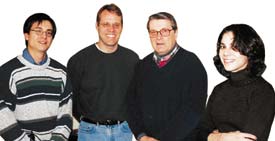
Ming J. Lowe, JD ’98, James R. Lovelace of the CDO, James F. McKeown, LLM ’74, and Beth M. Kramer, JD ’95, at the D.C. Bar Advice and Referral Clinic, January 2002.
|
Spring is the time of year when the Law School awards financial subsidies to students who will engage in full-time public interest work during the summer. The summer subsidies (which include The George Washington University Law School and Murray Snyder Fellowships, the J.B. and Maurice C. Shapiro Public Service Internships, and the Reuben A. Zubrow Public Interest Fellowship) cover a wide variety of public interest work, including the representation of otherwise under-represented populations, advocacy for organizations with environmental concerns, and legal work on issues of particular concern to ethnic groups, including the African American, Hispanic, and Latino populations. Student awardees serve populations in the Washington, D.C., area as well as throughout the country and internationally. Last year’s public interest employers included the D.C. Coalition Against Domestic Violence, the Legal Aid Foundation of Los Angeles, and The Wilderness Society. As in past years, the Law School expects to receive more than 60 qualified applications for these awards. Because of limited funds, the Law School will be able to provide approximately 30 students with cash grants and tuition remission awards ranging from $1,000 to $5,000 for their summer work.
In addition to the Law School’s subsidies, the student-run Equal Justice Foundation holds an auction each spring that separately funds summer public interest grants. Last year, thanks to generous donations from the GW community and local businesses, EJF provided $2,000 grants to 10 students.
—James R. Lovelace
If you have particular public interest news that you would like to share, please contact Jim Lovelace, assistant director and public interest liaison of the Career Development Office, at (202) 994-8594 or via e-mail at james@cdo.nlc.gwu.edu. Also, for a summary of many of GW’s ongoing public interest programs, such as GW’s Loan Reimbursement Assistance Program, see the Law School’s “Public Interest & Pro Bono” Web site at http://www.law.gwu.edu/pubint.
Faculty File:
News briefs from around the law school
Dean Michael K. Young continues to set the pace for a very busy Law School faculty. Examples: In September 2001 the U.S. Commission on International Religious Freedom announced the dean’s election as chairman. In October 2001 the Law School appointed him as Lobingier Professor of Comparative Law and Jurisprudence. And this winter Chief Justice of the United States William Rehnquist appointed him to the Brown v. Board of Education 50th Anniversary Commission. Elsewhere in the Law School,
Activities and Awards
- Paul Butler argued the case of U.S. v. LaSpina in the U.S. Court of Appeals for the Second Circuit in January. In February, he presented the Clauson Lecture at Western New England College of Law.
- Robert Cottrol became a member of the nominating committee for the American Society for Legal History. In January, he organized and chaired a session on “Racial Classification and Anti-Discrimination Law: Latin American Perspectives” at the AALS annual meeting.
- Charles Craver made presentations on negotiating to attorneys in New York City, Chicago, Charlotte, and Atlanta.
- Carol Izumi was elected chair of the AALS Section on Clinical Legal Education.Orin Kerr served as a panelist at the AALS conference in New Orleans in January. He presented a talk on “Internet Privacy and Law Enforcement.”
- Gregory Maggs, a reserve officer in the U.S. Army, served on active duty at the Pentagon in November, December, and January. He w s assigned to work on legal issues relating to the president’s decision to use military tribunals to try foreign terrorist suspects.
- Joan Meier was awarded the Edgar and Jean Cahn Article Award by the National Equal Justice Library for her article, “Domestic Violence, Character and Social Change in the Welfare Reform Debate.” The article was chosen from all eligible articles published during the 20th century.
- Jon Molot won the AALS scholarly paper competition for junior faculty in 2001 and was invited to present his paper at the AALS conference. The paper also was accepted for publication by the Northwestern Law Review.
- Peter Meyers, at the request of the National Academy of Sciences, is serving on the organization’s standing committee that reviews all of the Institute of Medicine’s reports on immunization issues for the next three years.
- Dawn Nunziato presented her paper, “Intergenerational Justice and Authors’ Rights in the Digital Age” at the University of Virginia School of Law Legal Studies Workshop this past fall. She also presented her paper, “A Medisonian Inquiry into Internet Governance” at the International Governance of New Technologies conference at George Mason University in February.
- Robert Peroni was co-chair of the 14th Annual Institute on Current Issues in International Taxation, held in Washington, D.C. During the 2002-03 academic year, Peroni will be a visiting professor of law at the Northwestern University School of Law.
- Richard Pierce presented a paper on the appropriate role of cost benefit analysis in environmental regulation at an ABA meeting in November. In January, he presented “Regional Transmission Companies Need Federal Limitations on Their Potential Tort Liability” at the annual meeting of electric utility CEOs.
- Alfreda Robinson was elected secretary of the 600-member AALS Litigation Section.
- Steve Schooner was appointed to the board of advisers of the National Contract Management Association.
- Peter Smith briefed and argued as an attorney for the U.S. Department of Justice (Hibbs v. Department of Human Resources). The Ninth Circuit recently held that the Family Medical Leave Act validly abrogates state sovereign immunity. The case is likely to end up before the U.S. Supreme Court.
- Joan Strand was appointed to a three-year term on the board of directors of the D.C. Bar Foundation.
- Ricardo M. Urbina was honored at the 2001 Equal Justice Awards Dinner sponsored by the Hispanic Bar Association of the District of Columbia.
Articles of Note
- Jerome Barron and Myra Barron’s article, “New Directions For Public Aid to Faith- Based Housing Activities?” was featured as the lead article in the November/December 2001 issue of Probate & Property.
- William Bratton’s article, co-authored with David Gantz of the University of Arizona, titled “WTO Case Review 2000” was published in the Arizona Journal of International and Comparative Law.
- Paul Butler’s “Terrorism, Utilitarianism, and the Criminal Law,” is to be published this spring by the Journal of Criminal Law and Criminology.
- Naomi Cahn published “The Coin of the Realm: Poverty and the Commodification of Gendered Labor,” at 5 Journal of Gender, Race & Justice 1 (2001).
- Bradford Clark’s essay, “Putting the Safeguards Back Into the Political Safeguards of Federalism,” was published at 80 Texas Law Review 327.
- Robert Cottrol’s article, “The Long Lingering Shadow: Law, Liberalism, and Cultures of Racial Hierarchy and Identity in the Americas,” was published at 76 Tulane Law Review 11 (2001).
- Matthew Harrington’s article, “The Economic Origins of the Seventh Amendment” was published in the Iowa Law Review.
- Shi-Ling Hsu’s article published in the February 2002 Harvard Environmental Law Review is titled, “A Game-Theoretic Approach to Regulatory Negotiation: A Framework for Analysis.”
- Lawrence Mitchell published “Of Distance, Role, and Accountability” in England’s Parliamentary Brief.
- Michael Selmi published two symposium contributions: “Why Are Employment Discrimination Cases So Hard to Win?” in the spring 2001 issue of the Louisiana Law Review, and “Care, Work, and the Road to Equality: A Commentary on Fineman and Williams,” at 76 Chicago-Kent Law Review 2001. His article “Remedying Society Discrimination Through the Spending Power,” is forthcoming in the North Carolina Law Review.
- Jonathan Siegel’s article, “What Statutory Drafting Errors Teach Us About Statutory Interpretation,” was published in 69 George Washington Law Review 309 (2001).
- Robert Tuttle and Ira Lupu published the article, “The Distinctive Place of Religious Entities in Our Constitutional Order,” at 47 Villanova Law Review 37 (2002)
Books Published
- Charles Craver
Alternative Dispute Resolution:
The Advocate’s Perspective
Michie, 2d. ed., 2001, Charlottesville, Va.
- C. Thomas Dienes
Newsgathering and the Law (cumulative supplement to 2d. ed., 1999)
Lexis Publishing, 2001, New York
- Carol Izumi
Race, Rights and Reparation: Law and theJapanese American Internment
Aspen Publishers, June 2001, New York
- Sean Murphy
Public International Law: In a Nutshell, Third Edition
West Publishing, April 2002, Eagan, Minn.
United States Practice in International Law 1999-2001: Volume One
Cambridge University Press, August 2002,
Cambridge, England.
- Lawrence E. Mitchell
Stacked Deck: A Story of Selfishness in America
Temple University Press, April 1998, Philadelphia
Corporate Irresponsibility: America’s Newest Export
Yale University Press, November 2001,
New Haven, Conn.
- Richard Pierce
Administrative Law Treatise, Fourth Edition
Little, Brown & Co., 2002, New York
- Peter Raven-Hansen
National Security Law Casebook, Third Edition
Aspen Publishers, April/May 2002, New York
Understanding Civil Procedure, Third Edition
Lexis Publishing, 2002, New York
- Arnold Reitze
Air Pollution Control Law: Compliance & Enforcement
Enviornmental Law Institute, 2001, Washington, D.C.
- John A. Spanogle
International Business Transactions: In a Nutshell
West Publishing, March 2000, Eagan, Minn.
E-Commerce Casebook
West Publishing, May 2002, Eagan, Minn.
- Michael K. Young
Japanese Law in Context: Readings in Society, the Economy and Politics
Harvard University Press, August 2001, Cambridge, Mass.
GW in History
25 Years Ago
During the summer of 1977, two Law School clinical studies programs merged: The Community Legal Clinic and the Legal Aid Bureau came together with the expectation of providing more effective legal assistance to the poor of the District of Columbia, in addition to offering an improved clinical program to participating students. The clinical program was then led by its longtime director, Professor Eric Sirulnik.
50 Years Ago
On Nov. 11, 1952, Daniel Ken Inouye, a 1950 graduate of the University of Hawaii, was granted his JD degree from the GW Law School. Those who know him today call him Senator Inouye, for he is now a U.S. senator from Hawaii.
100 Years Ago
Faculty members, students, and alumni gathered in farewell tribute to the retiring Law School dean, Judge Walter S. Cox. Representatives of the faculty, the board of trustees, the alumni association, and the students delivered speeches, as did Samuel S. Greene, acting president of the University. The following day Dean Cox was presented with a silver pitcher as a token of the school’s appreciation for his 28 years of service.
The Magazine gratefully acknowledges the assistance of University Archives in the identification of historical information. Readers wanting to learn more about GW’s history can find the University Archives Web site by accessing www.gwu.edu/~archives. The site’s Historical Almanac is especially informative.
Corrections:
In the August 2001 issue, GW Law School magazine incorrectly stated the clerkship information for Jonathan Goldstein. It should have read that Goldstein was clerking for Chief Justice William A. Maupin of the Nevada Supreme Court. We apologize for any problems this error may have caused.
A letter from Steven C. Kameny, JD ’01, asks that we add his name and that of Nadja J. Harrigan, JD ’01, to our clerkship list. Both are clerking at the Territorial Court of the Virgin Islands, an Article IV court. Kameny is clerking for the Hon. Brenda J. Hollar, and Harrigan for the Hon. Ishmael A. Meyers, who also is a GW law graduate.
Back to top | Spring 2002 Table of Contents
|
|
|
|
|